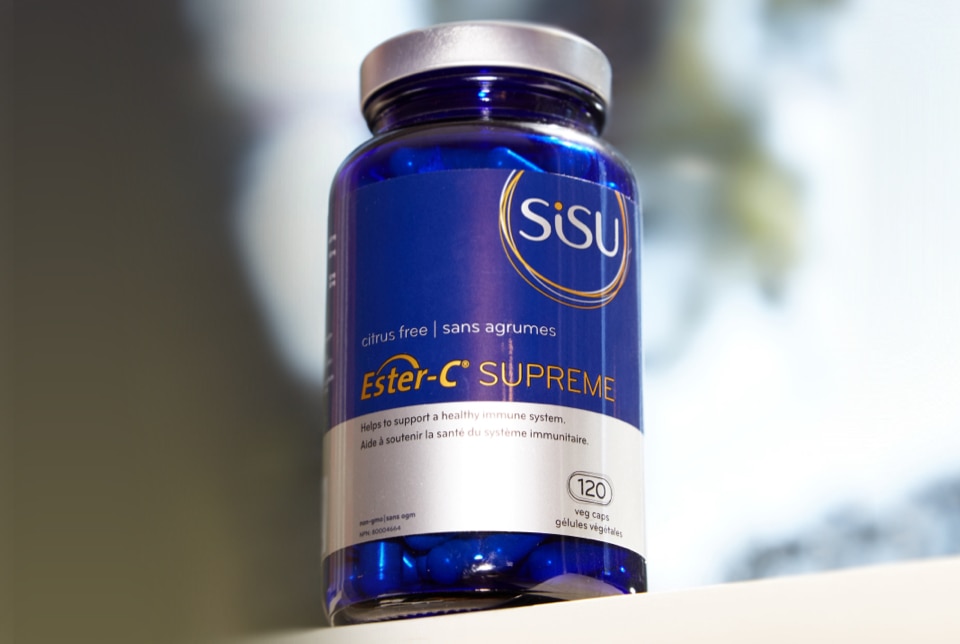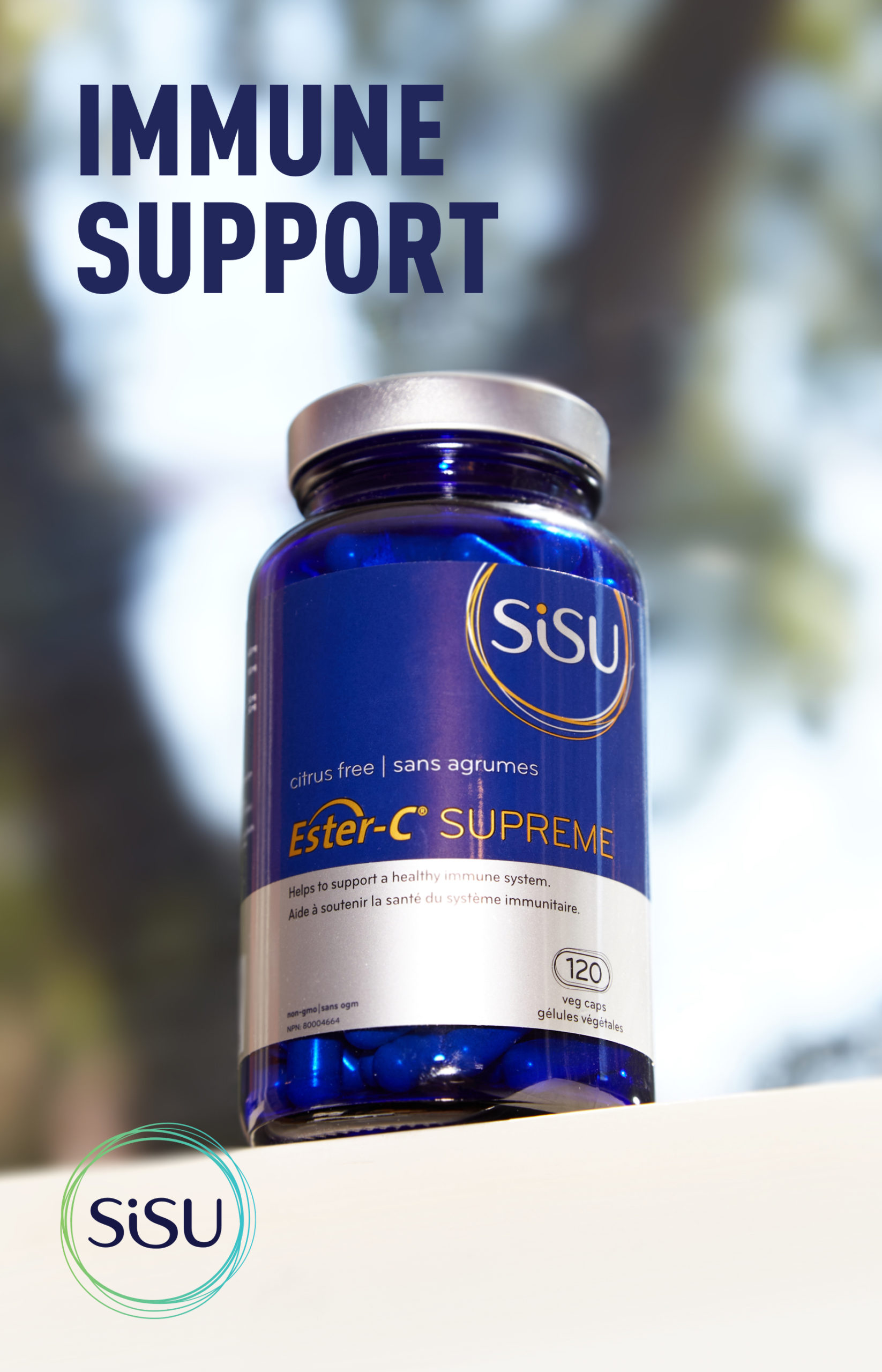

As winter begins, it’s time to prepare your immune system for cold and flu season. Understanding how the immune system works and the factors in your environment that affect it, will help you make the right choices for your immune health.
Let’s take a closer look at four things you may not realize are affecting your immune system, and what to do about them.
What is the immune system?
The immune system is your body’s natural defence system. It’s a complex network of cells, tissues, and organs that help protect the body from germs and unwanted invaders. When it’s healthy, it will keep a range of health problems at bay, or minimized. Even when a germ slips past our protective barriers, a healthy immune system will activate white blood cells, chemicals, and proteins to attack and destroy these invaders.
Along with common conditions such as allergies and autoimmune diseases, various environmental factors (i.e. diet, stress, sun exposure, etc.) may affect immune system function.
So how does it work?
Innate Immunity vs. Adaptive Immunity
The immune system has two main parts that work together to protect against foreign invaders.
Your innate immune system is the one you’re born with, which is the body’s first line of defense against germs. If you scraped your knee and had a small wound, then your innate immune system would work fast and effectively at detecting and destroying any bacteria before it enters your body.
The adaptive immune system helps if the innate immune system isn’t able to destroy the germs and targets the specific germ causing the infection. Helper T Cells activate white blood cells to make immune responses — such as producing antibodies.1
Adaptive immunity is slower to respond but does a better job at remembering germs, which explains why there are some illnesses (ex. chickenpox) that you can only get once. Even if your body comes into contact with the same germ again, the adaptive immune response is better equipped to react and respond more effectively.2
The Immune System and the Environment
A study conducted by Stanford scientists found that our immune system is shaped more by the environment than by our genes.3 This helps explain why new research is starting to uncover how current lifestyle changes affect the body’s susceptibility to infection and disease. These influences can help us understand what’s happening to our immune systems and why prioritizing our immune health is more important than ever. Let’s take a closer look at four things that can affect your immune system.
Exposure to germs
Exposure to normal environmental microbes and bacteria during infancy helps immune memory mature, so that eventually your immune system will mount a quicker response to future microbes. This is also referred to as the “hygiene hypothesis” which has verified that young children who have early exposure to different germs, are less likely to develop allergies and autoimmune diseases such as asthma or hay fever.4
Loss of microbial diversity
The more diverse and rich your gut is, the stronger your immune system is.5 Microbial diversity exposure helps educate the immune system’s memory to defend against similar pathogens in the future.6
A lack of microbial diversity has been occurring over the last century due to the overuse of antibiotics, increased consumption of processed foods, and the disinfecting of our homes and workplaces.7
The shift and loss of microbiome diversity may negatively impact immune system response, especially when a healthy gut microbiome relies on diversity.
Weather changes
Common colds and cases of the flu are more likely to happen in colder months due to several factors. We need sufficient vitamin D for healthy immune function. But shorter days and lack of sun exposure mean that most of us are not getting enough vitamin D. We spend more time indoors in close quarters, making it easier to spread or catch germs and viruses from others. Common cold and flu viruses are more likely to survive and be transmitted in colder, drier climates.8 Studies also suggest that exposure to cold may limit immune response, resulting in greater susceptibility to unwanted germs and bacteria.9
Loneliness and stress
Our health and wellbeing is dependent on physical and mental balance. Psychological effects like loneliness and stress can also weaken the immune system. Our anti-viral response is suppressed when we feel lonely.10 And when you’re stressed, the immune system’s ability to fight off antigens is reduced, making you more susceptible to illness. The stress hormone corticosteroid can suppress the effectiveness of the immune system by lowering the number of lymphocytes.11
Now that we’ve identified some current immune system challenges, let’s take a look at simple ways you can support your immune health.
5 Ways to Support Your Immune Health
1. Get quality sleep
Sleep and immune health are deeply connected. Without enough sleep, the body makes fewer cytokines – a protein that targets infection and inflammation, creating an immune response.12
The average adult needs between seven to nine hours of sleep each night. Children need anywhere from nine to fourteen hours of sleep, and teens require eight to ten hours. In theory, this sounds good. But in practice, it’s not always easy to fall asleep—especially in stressful times. Here are some bedtime habits to improve your sleep:
- write a to-do list for the next day;
- put the screens away;
- go to bed and wake up at a consistent time; and,
- limit caffeine intake closer to bedtime.
Supplement for sleep
Sisu Melatonin can help you fall asleep more easily, sleep longer, and wake up less frequently during the night. Each serving is vegan-friendly, non-GMO, dairy-free, soy-free, and gluten-free.
2. Eat a nutritious diet
Good nutrition is vital for supporting healthy immune responses. A nutritious diet packed with vitamins and minerals, particularly vitamins A, C, D, E, B2, B6, and B12, folic acid, iron, selenium, and zinc, influences immune strength and susceptibility to infectious diseases.13 Whole plant foods like fruits, vegetables, nuts, seeds, and legumes nourish your body with essential vitamins and antioxidants that help the immune system effectively respond against harmful bacteria and pathogens.14
A diet rich in fiber also contributes to the maintenance of a healthy gut microbiota, which can ultimately promote a healthy digestive system and immune system.15 Some good sources of fiber include:
- Whole grains: brown rice, oats, quinoa
- Fruits: avocados, pears, strawberries
- Vegetables: broccoli, carrots
- Legumes: lentils, chickpeas, kidney beans
- Nuts and seeds: almonds, chia seeds
3. Minimize stress
Dealing with work, everyday activities, and familial responsibilities can take a toll. Stress shows up physically, emotionally, or behaviorally. While short-term stress is inevitable in some cases, it’s important to prioritize your well-being before you reach stress overload. Long-term stress can disrupt all your bodily processes, putting you at an increased risk of health problems.
To minimize stress, identify what’s causing it and then make a plan for success. Here are some steps you can take to reduce stress16:
- Mindfulness meditation: Sit comfortably, focus on your breathing and bring your attention to the present moment.
- Body scan: After a few minutes of deep breathing, focus on one part of the body at a time and mentally release any physical tension.
- Practice yoga or tai chi: Combine rhythmic breathing with a range of flexibility and balancing poses that help offer mental focus.
- Talk with loved ones: Support from family and friends can give you connection and a sense of belonging, which is helpful in tough times.17
There’s no one-size-fits-all when it comes to reducing stress, but these tips will help increase your feelings of well-being.
Supplements for stress
Featuring 250 mg of calming L-theanine, Sisu Stress Rescue helps to temporarily promote relaxation so that you can feel your best. Available in capsule or chewable form.
Sisu Magnesium Relaxation Blend
Sisu Magnesium Relaxation Blend is the most delicious way to help temporarily promote relaxation. Featuring magnesium, GABA, and L-theanine, this easy-to-mix powder is available in raspberry-lemonade, honey-grapefruit and tart cherry flavours.
4. Exercise
Start moving! Exercise has many health benefits like stress relief, better sleep, improved focus—and even supports a stronger immune system. Regular exercise may reduce inflammation and help your immune cells regenerate.18 Canada’s food guide recommends adults should accumulate at least 150 minutes of moderate- to vigorous-intensity aerobic physical activity per week.
It’s not always easy to maintain an exercise routine during the colder months, but even getting outside for a 30-minute walk is good for you! Schedule your week to include time for moderate exercise, like jogging, biking, walking, or swimming.
5. Check in with your doctor regularly
Regular check-ups with your healthcare provider can help find potential health issues before they become a problem. It also helps you to be better informed about your health and what you can do to live a healthy lifestyle.
Need more immune health support? Try one of our supplements.
Ester-C® Supreme is a citrus free formula that helps to support a healthy immune system. Ester-C® is more gentle on the stomach than regular vitamin C, and stays in the body for up to 24-hours. It’s also vegan, non-GMO, and gluten-free.
Cold & Flu Rescue is available in an adult and kid-friendly formula. Both products feature immune supporting Ester-C® to help relieve cold symptoms and to help fight off infections, especially of the upper respiratory tract.
Sisu Zinc Lozenges support a healthy immune system and energy metabolism. And they promote healthy hair, skin, and nails!
Sisu NAC 600 mg helps relieve the symptoms of chronic bronchitis and reduces the symptoms of respiratory infection.
Our Energy Boost™ vitamin drink mix provides 1000 mg of Ester-CⓇ to help maintain immune function.
Summing up
We can trust that our immune system knows what it needs to do to protect the body from harm. But sometimes environmental and lifestyle challenges can inhibit its performance. Exercising regularly, eating well, managing stress, getting good sleep, and staying on top of doctor visits are great ways to promote immune health.
Add a dose of health and wellness to your inbox and be the latest to learn about new Sisu products by subscribing to our newsletter! (Don’t worry, we won’t spam you.)
Always read and follow the product label. Products may not be suitable for everyone.
1 https://www.ncbi.nlm.nih.gov/books/NBK26827/
2 https://www.ncbi.nlm.nih.gov/books/NBK279396/
3 https://med.stanford.edu/news/all-news/2015/01/environment-not-genes-plays-starring-role-in-immune-variation.html
4 https://www.sciencedaily.com/releases/2012/03/120322142157.htm
5 https://www.ncbi.nlm.nih.gov/pmc/articles/PMC3577372/
6 https://www.ncbi.nlm.nih.gov/pmc/articles/PMC6102609/
7 https://www.pnas.org/content/118/6/e2010217118.long#sec-1
8 https://www.pnas.org/content/112/3/827
9 https://cdnsciencepub.com/doi/pdf/10.1139/y98-097
10 https://genomebiology.biomedcentral.com/articles/10.1186/gb-2007-8-9-r189
11 https://www.ncbi.nlm.nih.gov/pmc/articles/PMC1361287/
12 https://www.sleepfoundation.org/physical-health/how-sleep-affects-immunity#:~:text=Sleep%20and%20Cytokines,you%20skimp%20on%20shut%2Deye
13 https://www.ncbi.nlm.nih.gov/pmc/articles/PMC6212925/
14 https://www.ncbi.nlm.nih.gov/pmc/articles/PMC6723551/
15 https://www.sciencedirect.com/science/article/pii/S193131281830266X#:~:text=A%20diet%20rich%20in%20
fiber,chain%20fatty%20acids%20(SCFAs)
16 https://www.health.harvard.edu/mind-and-mood/six-relaxation-techniques-to-reduce-stress
17 https://pubmed.ncbi.nlm.nih.gov/19331256/
18 https://www.ncbi.nlm.nih.gov/pmc/articles/PMC7387807/


